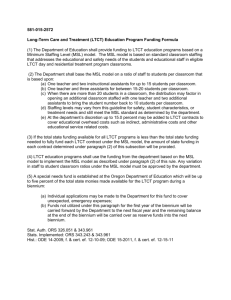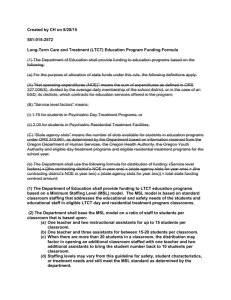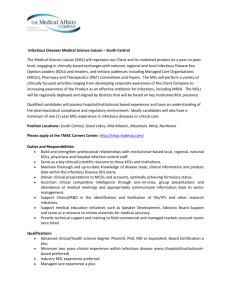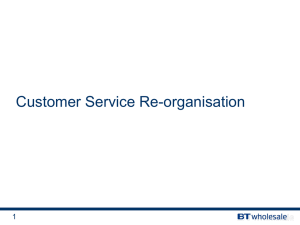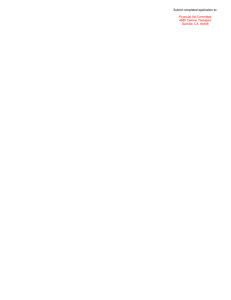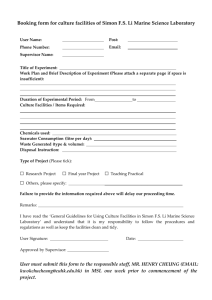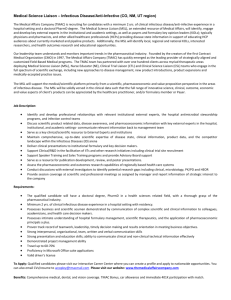SOC 111-02
advertisement
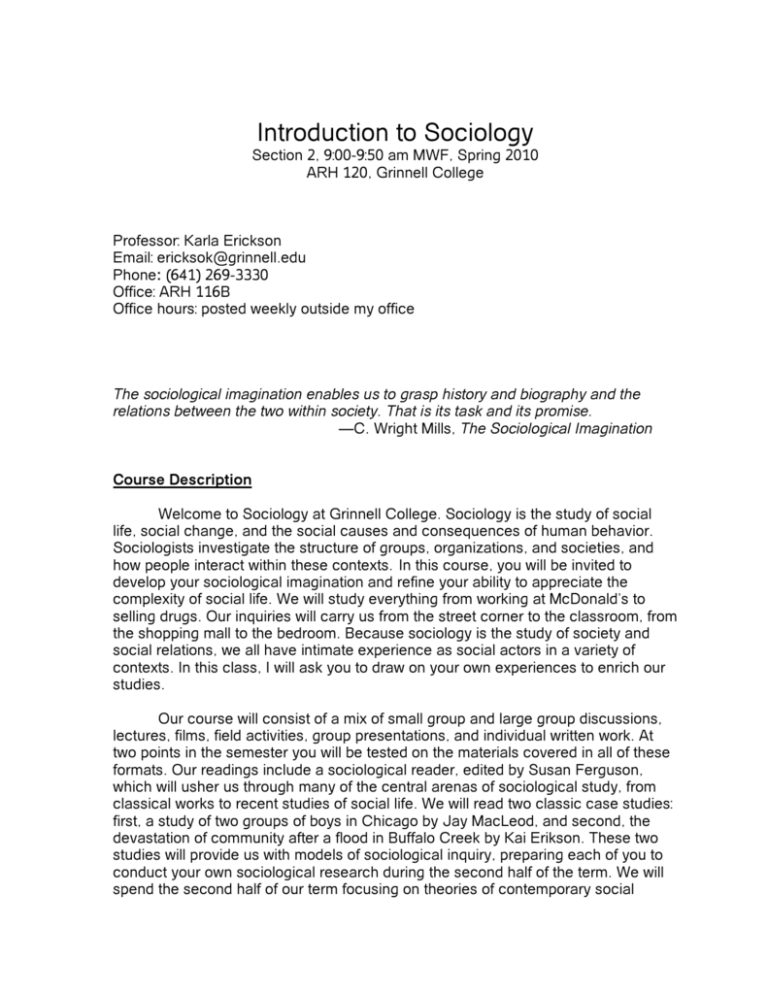
Introduction to Sociology Section 2, 9:00-9:50 am MWF, Spring 2010 ARH 120, Grinnell College Professor: Karla Erickson Email: ericksok@grinnell.edu Phone: (641) 269-3330 Office: ARH 116B Office hours: posted weekly outside my office The sociological imagination enables us to grasp history and biography and the relations between the two within society. That is its task and its promise. —C. Wright Mills, The Sociological Imagination Course Description Welcome to Sociology at Grinnell College. Sociology is the study of social life, social change, and the social causes and consequences of human behavior. Sociologists investigate the structure of groups, organizations, and societies, and how people interact within these contexts. In this course, you will be invited to develop your sociological imagination and refine your ability to appreciate the complexity of social life. We will study everything from working at McDonald’s to selling drugs. Our inquiries will carry us from the street corner to the classroom, from the shopping mall to the bedroom. Because sociology is the study of society and social relations, we all have intimate experience as social actors in a variety of contexts. In this class, I will ask you to draw on your own experiences to enrich our studies. Our course will consist of a mix of small group and large group discussions, lectures, films, field activities, group presentations, and individual written work. At two points in the semester you will be tested on the materials covered in all of these formats. Our readings include a sociological reader, edited by Susan Ferguson, which will usher us through many of the central arenas of sociological study, from classical works to recent studies of social life. We will read two classic case studies: first, a study of two groups of boys in Chicago by Jay MacLeod, and second, the devastation of community after a flood in Buffalo Creek by Kai Erikson. These two studies will provide us with models of sociological inquiry, preparing each of you to conduct your own sociological research during the second half of the term. We will spend the second half of our term focusing on theories of contemporary social 2 practices. We’ll read a book I wrote about consumerism, work, identity and the production of community entitled The Hungry Cowboy: Service and Community in a Neighborhood Restaurant. Each of the studies we work with will provide examples of sociological inquiry. I hope our course will be an exciting and challenging introduction to sociological practice. Welcome to the class. I’m glad you’re here. Objectives It is my hope that together we will: 1. Become familiar with the questions sociologists ask, the research methods sociologists use to answer their questions and the theories sociologists use to interpret their findings. 2. Refine our ability to situate individual and group behaviors within larger social structures and institutions. 3. Recognize and critically evaluate the forces of social stratification that facilitate and constrain human behavior. 4. Develop your ability to apply a sociological perspective to your own life, hopes, dreams, values and plans. 5. Improve your skills of writing, discussing, listening, and presenting your ideas in an enthusiastic and compelling manner. Books & Supplies Mapping the Social Landscape: Readings in Sociology, 6th Edition Susan J. Ferguson, ed. McGraw Hill, 2010 Ain't No Makin' It: Leveled Aspirations in a Low-Income rd Neighborhood, 3 Edition Jay MacLeod Westview Press, 2008 Everything in Its Path: Destruction of Community in the Buffalo Creek Flood Kai T. Erikson Simon and Schuster, 1976 The Hungry Cowboy: Service and Community in a Neighborhood Restaurant Karla A. Erickson University Press of Mississippi, 2009 Reading Journal --of your choosing, dedicated to this course for notes and observations Attendance and Deadlines This course requires a high level of student interaction, participation and involvement. I expect you to come to class on time, prepared and ready to discuss. Each class meeting you are expected to have read all the assigned readings and have worked in your reading journal beforehand, in order to come to class prepared to actively discuss the materials. The course starts promptly at 9:00am; I take attendance at the start of class, so be on time. Everyone gets one “oops” as I call it, one day off from the course while still getting full credit for attendance. More than 3 three unexcused absences will lower your final grade for the course (every additional absence will lower your grade one step, for example from an A- to a B+). When you do need to miss class, it is your responsibility to get notes and an update from a classmate and to contact me regarding your absence. Your written work needs to be in on time. I rarely allow late work to be handed in, and only if you contact me in advance of the deadline. All written assignments must be printed out and handed in, I do not accept emailed assignments. Whenever possible, please print double-sided. Assignments should either be handed in during class, or to my mailbox in Carnegie 115. Contacting Me I expect to stay in contact with students throughout the term. Please come by during my office hours to discuss course content, your thoughts or concerns about assignments, or to get extra assistance. A sign up sheet for my office hours is posted weekly outside my office (ARH 116B). If you cannot attend my office hours, talk to me about scheduling an appointment at a different time. I am online daily, so email is the fastest way to get in touch with me. Course Policies *If you have a physical or learning disability that requires you to make some adaptations to this course, please contact me to discuss arrangements. All conversations will be confidential. For help with disability services, contact Joyce Stern (3702). The Student Affairs Office offers a wealth of resources for all students. Stop in during business hours on the third floor of the JRC, or during drop-in hours, Friday 1:30-4:30. *In any papers written for this course, you must abide by the College’s rules on plagiarism as outlined in the Student Handbook, which require you to "acknowledge explicitly any expressions, ideas, or observations that are not" your own. In addition, I expect that all formal papers will contain a footnote acknowledging any assistance of any kind you received in producing the paper. I recommend making use of the talent and assistance of the professionals in the writing lab. If you do go to the writing lab, remember to cite the person who assisted you. Assignments Participation Student participation is central to this course. I expect you to come to class with your readings done, with prepared responses and ideas, ready to discuss with your classmates. In addition to your group presentation, I expect students to interact, ask questions, share insights, and push each other’s thinking throughout the term. The participation grade is determined by your level of involvement, both in terms of frequency and quality of your contributions. Your participation grade will reflect how much and how well 4 you contribute to our shared exploration of sociology. If you have any concerns about this portion of the grade, please speak to me early in the term. (20%) Reading Journal This course requires a significant amount of writing and discussion. Your reading journal will be your greatest tool for developing your sociological imagination, and coming to class prepared to participate. Please have a notebook dedicated to this course that you can use to make reading, discussion and lecture notes, to keep track of your in-class freewrites and also to record your conclusions during field observations. (The journal is not graded, however your efforts will be reflected in your ability to prepare for exams, formal written assignments and class discussions.) Field Observations This course is not only about reading and understanding sociological principles and practices, it is also about DOING sociology. Throughout the term, we will be putting learning into practice through field exercises that invite you to activate your sociological imagination by becoming a participant observer. Several times during the semester, I will ask you to hand in an informal written report of your field observations. (10%) Panel Presentation Along with several of your classmates, you will be responsible for leading one class discussion. We will discuss the panel presentation assignment and sign up for dates to present early in the semester. Your group will need to read the assigned readings in advance and meet with me to brainstorm and plan out your presentation. The panel presentation grade will be based on your planning and preparation as demonstrated during the class period you lead, peer evaluation of the presentation, and the outline or group plan that you hand in to me on the date of your presentation. (10%) Analytical Essays Each of you will apply your sociological and analytical skills in two essays. The essays will require you to combine your knowledge from our readings and discussions with original argumentation and conclusions. For each essay, you will receive detailed directions well in advance. (15% X 2 = 30%) Exams Two exams based on weekly readings and discussion, are scheduled throughout the term. If you participate in discussions, take excellent reading notes, and keep up with the readings for the course, you will be prepared for both of these exams. (15% each) Grading Participation 20% Field Observations 10% Panel Presentation 10% Analytical Essays (15% each) 30% 5 Midsem Exam 15% Final Exam 15% Grading Distribution 94 and up A 90-93 A- 87-89 B+ 84-86 B 80-83 B- 76-79 C+ 70-75 C 60-69 D A Note on Reading While reading, you should be seeking to answer the following questions: 1. What is the author’s main point or argument? 2. What theories and research methods does the author use to demonstrate his/her point? 3. What key pieces of evidence are presented in support of the author’s argument? 4. What are the strengths and weaknesses of the particular argument? 5. What questions does this argument raise for you? 6. How does this article or chapter relate to previous discussions, readings or experiences? A Note on Writing While what you write is essential, how you present your ideas in writing is also extremely important. The reflection papers will provide you with an opportunity to exercise and strengthen your writing skills. I recommend that you take advantage of the Writing Lab for assistance with your assignments. If you do go to the Writing Lab, acknowledge the assistance of your tutor in your paper. We will work through the stages of the research paper together. You will also have an opportunity to circulate a draft of your final project before handing it in for a grade. 6 Course Schedule This schedule is tentative and subject to change. Week 1 2 3 Date Assigned Reading Topic 1/25 M First Day-Welcome and Introduction to the Course 1/27 W C. Wright Mills, “The Promise” MSL 1-6 Michael Schwalbe “Finding Out How the Social World Works” MSL 33-42 Mitchell Duneier “Sidewalk” MSL 53-60 Sociology as Discipline 1/29 F MacLeod, “Social Immobility in the Land of Opportunity” 3-10 Donna Gaines “Teenage Wasteland” MSL 7-18 Mary Romero “An Intersection of Biography and History: My Intellectual Journey” MSL 19-32 “Doing” Sociology 2/1 M Guest Lecturer: Dr. Beth Latshaw 2/3 W C. Wright Mills “The Power Elite” MSL 407-414 Karl Marx and Friedrich Engels “Manifesto of the Communist Party” MSL 399-405 Max Weber “The Protestant Ethic and the Spirit of Capitalism” MSL 499-505 2/5 F Craig Haney, et al “Interpersonal Dynamics in a Simulated Prison” MSL 43-52 Gwynne Dyer “Anybody’s Son Will Do” MSL 135-146 Steven Dandeneau “Religion and Society: Of Gods and Demons” MSL 506-515 Institutions 2/8 M MacLeod, “Social Reproduction in Theoretical Perspective” 11-24 Kingsley Davis, et al “Some Principles of Stratification” MSL 247-256 Theory 2/10 W MacLeod, “Teenagers in Clarendon Heights: The Hallway Hangers and the Brothers” 25-50 Patricia Adler and Peter Adler “Peer Power: Clique Dynamics among School Children” MSL 147-161 Amy Young “Drinking Like a Guy: Frequent Binge Drinking Among Undergraduate Women” MSL 314329 Socialization 2/12 F Family MacLeod, “The Influence of the Family” 50-60 Foundations of Sociology 7 Ann Crittendon, “The Mommy Tax” MSL 601-610 Andrew Cherlin “The Deindustrialization of American Marriage” MSL 589-600 Annette Lareau “Invisible Inequality: Social Class and Childrearing in Black Families and White Families” MSL 611-626 4 2/15 M MacLeod, “The World of Work: Aspirations of the Hangers and the Brothers”, 62-83 Paul Draus and Robert G. Carlson “Down on Main Street: Drugs and the Small-Town Vortex” MSL 218233 A Ayres Boswell and Joan Z. Spade “Fraternities and Collegiate Rape Culture: Why are Some Fraternities More Dangerous Places for Women?” MSL 234-246 2/17 W MacLeod, “School: Preparing for the Competition” 84112 Mary Crow Dog and Richard Erdoes “Civilize Them with a Stick” MSL 561-567 Jonathan Kozol, “Still Separate, Still Unequal: America’s Educational Apartheid” MSL 568-579 Social Structure Education Group 1 Presents 5 2/19 F MacLeod, “Leveled Aspirations: Social Reproduction Takes Its Toll” 113-136 Robert Granfield “Making It by Faking It: WorkingClass Students in an Elite Academic Environment” MSL 123-135 G. William Domhoff “Who Rules America? The Corporate Community and the Upper Class” MSL 257-269 Social Inequality: Class 2/22 M MacLeod, “Reproduction Theory Reconsidered” 137-153 Eduardo Bonilla-Silva “’New Racism: Color-Blind Racism, and the Future of Whiteness in America” MSL 345-360 Katherin M. Flower Kim, “Out of Sorts: Adoption and (Un) Desirable Children” MSL 371-383 Charlie Le Duff “At a Slaughterhouse, Some Things Never Die” MSL 361-370 Social Inequality: Race 2/24 W FILM: Race: The Power of an Illusion Structural Inequality: Race 2/26 F Dreams and Aspirations MacLeod, “The Hallway Hangers: Dealing in Despair” 157-197 Ann Arnett Ferguson “Bad Boys: Public Schools in the Making of Black Masculinity” MSL 580-588 Thomas Shapiro “The Hidden Cost of Being African American: How Wealth Perpetuates Inequality” MSL 270-281 8 Group 2 Presents 6 7 8 3/1 M 3/3 W MacLeod “The Men at Midlife” and “Afterword” 275465 3/5 F FILM: People Like Us Analytical Memo DUE 3/8 M Midsem Review – Review Sheets DUE 3/10 W Erikson, “Introduction” and “February 26, 1972”, 1-50 Crisis 3/12 F Erikson, “Notes on Appalachi” and “The Mountain Ethos” 51-93 Kathleen M. Blee “Becoming a Racist: Women in Contemporary Ku Klux Klan and Neo-Nazi Groups” 200-213 (supp) Groups 3/15 M Erikson, “The Coming of the Coal Camps” and “Buffalo Creek” 94-134 Stereotypes and Norms 3/17 W Erikson, “Looking for Scars,” 135-155 Mark Colvin “Descent into Madness: The New Mexico State Prison Riot” MSL 183-196 David A. Karp “Illness and Identity” MSL 547-560 3/19 F 3/204/4 9 MacLeod “The Brothers: Dreams Deferred” and “Conclusion: Outclassed and Outcast” 198-271 Cultural Accommodation Social Fragmentation and Deviance In-Class Mid-semester Exam SPRING BREAK – Enjoy your break 4/5 M Erikson, “Individual Trauma: State of Shock” 156-185 David Rosenhan “On Being Sane in Insane Places” MSL 197-206 Penelope A. McLorg and Diance E. Taub, “Anorexia Nervosa and Bulimia: The Development of Deviant Identities” MSL 207-217 4/7 W Erikson, “Collective Trauma: Loss of Communality,” and “Conclusion,” 186-260 Social Labels, Groups and Identity Community 9 10 4/9 F HC “Spaces in the Marketplace” 3-27 George Ritzer, “The McDonaldization of Society” MSL 662-671 (supp) Work and Identity 4/12 M Barbara Ehrenreich “Nickel and Dimed: On (Not) Getting By in America” MSL 282-294 Charles Derber, “One World Under Business” MSL 420-432 Gregory Mantsios “Media Magic: Making Class Invisible” MSL 433-440 Work and Social Class 4/14 W HC, “Producing Familiarity: Servers at the HC” 28-60 Meika Loe “Working at Bazooms: The Intersection of Power, Gender, and Sexuality” MSL 314-329 Robin Leidner “Over the Counter: McDonald’s” MSL 474-488 Service Work Group 3 Presents 11 12 4/16 F HC “Consuming Belonging: Feeling ‘At Home’ at the Hungry Cowboy” 61-91 Elijah Anderson “The Cosmopolitan Canopy” MSL 384-398 Public/Private 4/19 M HC “Managing Service: Training and the Production of Ambience” 92-116 Arlie Russell Hochschild “The Time Bind: When Work Becomes Home and Home Becomes Work” MSL 494-503 Emotional Labor 4/21 W HC “Feeling Like Family: Paternalism, Loyalty and Work Culture” 117-139 Russell Shorto “Faith at Work” 516-526 Workers, Loyalty and Ideology 4/23 F “Reflections on the Hungry Cowboy” 140-152 Christine L. Williams “Shopping as Symbolic Interaction: Race, Class and Gender in the Toy Store” MSL 172-182 Consumption and Ethnography 4/26 M Barbara Risman “Gender as Structure” MSL 306314 Judith Lorber, “’Night to His Day’: The Social Construction of Gender” MSL 96-108 Gender and Structure Analytical Essay #2 DUE 4/28 W Betsy Lucal, “What it Means to be Gendered Me: Life on the Boundaries of a Dichotomous Gender Doing Gender in Daily Life 10 System” MSL 108-122 C. J. Pascoe “Dude, You’re a Fag?: Adolescent Male Homophobia” MSL 305-313 Group 4 Presents 13 4/30 F Dan Claswon, et al “Dollars and Votes: How Business Campaign Contributions Subvert Democracy” MSL 406-419 Sabeen Sandhu “Instant Karma: The Commercializatino of Asian Indian Culture” MSL 7887 Kaunani-Kay Trask “Lovely Hula Hands: Corporate Tourism and the Prostitution of Hawaiian Culture” MSL 88-95 5/3 M Final Review – Review Sheet DUE 5/5 W Barry Glassner, “Why Americans Fear the Wrong Things” MSL 61-68 Brigitte L. Nacos and Oscar Torres Reyna “Muslim Americans in the News before and after 9/11” MSL 433-440 Karen Sternheimer, “It’s Not the Media: The Truth About Pop Culture’s Influence on Children” MSL 454-467 Consumer Politics Mediated Fears Group 5 Presents 14 5/7 F Eric Klinenberg “Dying Alone: The Social Production of Urban Isolation” MSL 534-546 Lillian B. Rubin “Sand Castles and Snake Pits” MSL 527-533 D. Stanley Eitzen “The Atrophy of Social Life” MSL 641-648 Social Problems 5/10 M Charles L. Harper and Kevin T. Leicht “American Social Trends” MSL 627-640 Allan G. Johnson “What Can We Do? Becoming a Part of the Solution” MSL 649-660 Social Action 5/12 W In-Class Final Exam 5/14 F Last Day: Wrap up and evaluation
